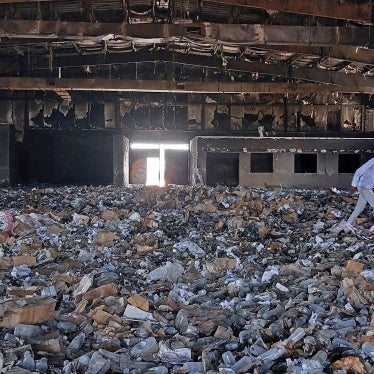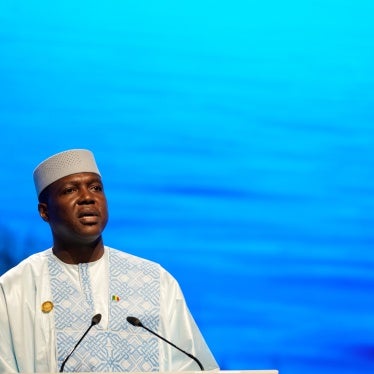Over my last five years as a researcher with Human Rights Watch, I’ve listened to hundreds of men, women, and children in Côte d’Ivoire recount horrific abuses they saw or experienced linked to the country’s decade-long politico-military crisis. I wish I could say with confidence that these victims will have their day in court. But while President Alassane Ouattara’s government has overseen an economic rebound in the three years since elections sparked five months of deadly violence, it has left largely untouched the legacy of impunity for those in power, threatening the sustainability of the country’s recovery.
Although acute periods of conflict in Côte d’Ivoire have been short in comparison to the experience in neighbors like Liberia and Sierra Leone, the gravity of the crimes– and the targeting along political and ethnic lines – has left deep wounds and divisions. The Ivorian crisis has been far less about fighting for territory than sending political messages through violence. Civilians have borne the brunt, killed or raped for nothing more than their name or dress.
I’ll never forget the man, his face and voice drained of all life, who described how militiamen loyal to former President Laurent Gbagbo murdered his five adult sons, then looted his refrigerator and, taking a snack break from their rampage, left crumbs amid the dead bodies. Or a woman from a village in western Côte d’Ivoire who hid in the bush and watched pro-Ouattara forces kill her father, husband, and son; when I interviewed her several weeks later, after she fled to Liberia, she blamed herself for starting a cooking fire that alerted soldiers to their presence.
Appalling violence became banal. Heavy weapons were launched into densely packed neighborhoods; grenades were rolled into crowds of demonstrators; people were stopped at militia checkpoints and burned alive. Several weeks after Gbagbo’s arrest, I happened across a body that was still burning, though in this case the victim had first been executed by gunshot. There was a crowd and people were taking pictures, but my most vivid memory is of the smell.
It was often hard to grasp how a country like Côte d’Ivoire could descend into such violence. Ivorians are, almost without fail, warm and embracing hosts. I can’t count the number of times that, as I sat down to talk, a victim would quietly send a family member out to buy me a Coke. Generosity usually seemed to be at its greatest in the poorest neighborhoods of Abidjan and in villages throughout the country.
Because of the country’s economic boom in the 1960s and 70s, its infrastructure remains the envy of many of its neighbors. After years of mismanagement during the political upheaval, the Ouattara government has aggressively embarked on having the country retake its place as the economic giant of the sub-region. Progress is evident in repaved roads, revamped courthouses, and visible headway on ambitious infrastructure projects that had been in limbo for years. Abidjan again bursts with the energy of a dynamic city.
Despite the country’s undeniable potential, two issues leave me apprehensive about whether it has left behind the recent history and will be able to avoid yet another spasm of violence. First, state institutions are extremely weak, and every normal check on government power – including the press, the judiciary, and even many non-governmental organizations – is deeply politicized. Ivorian politics is also devoid of true political platforms. Rather, patronage networks and cults of personality develop around individuals, with elections won through building regional-ethnic blocs and spreading wealth and access to power further than an opponent. Holding political power thus requires a considerable amount of money, fueling high levels of corruption.
Presidents, in whom almost all state authority is concentrated, then stack governments and elite security force units with people from their regional-ethnic constituency, marginalizing the rest of the population. Many of us hoped that this would change with President Ouattara. It hasn’t.
With politics an all-or-nothing game, Ivorian leaders have shown themselves willing to use any means necessary to obtain power. Militia groups associated with former President Gbagbo typified the way that some politicians manipulated youth supporters and ethnic tensions to often violent ends. There is little reason to think this will change until politics becomes about a vision for the entire country, rather than ensuring that one’s regional-ethnic bloc gets access to government jobs and coffers. Neither side has shown much interest in handing over their stocks of weapons, in case there is a need to fight it out again tomorrow.
Second, a persistent culture of impunity has sent the message that political violence is tolerated. In Côte d’Ivoire, the justice system does its best to hold a common thief accountable. But if you engage in mass killings, rape, or pillage in the fight for political power, history has shown that an amnesty deal will be struck, either by law or de facto. Without exception, the armed forces and political backers responsible for atrocities during the 2000 electoral violence and the 2002-2003 armed conflict avoided justice for those crimes. Many of the same people would commit or oversee similar atrocities during the 2010-2011 crisis.
Despite strong promises from President Ouattara to ensure impartial justice for these crimes, progress has been limited and almost entirely one-sided– undermining reconciliation and continuing the legacy of political and ethnic division. Several hundred pro-Gbagbo defendants have been arrestedand imprisoned, but, three years later, authorities have yet to hold a single trial in civilian court related to the crisis.
No member of Ouattara’s Republican Forces has even been arrested for crimes committed during the crisis, despite findings by a national commission of inquiry that they carried out more than 500 summary executions. The government has made a mockery of judicial independence; failed to ensure protection for judges, prosecutors, and witnesses; and promoted former rebel warlords suspected of involvement in grave crimes to the highest levels of the military.
This new round of impunity has again sent the message that the political and military elite – particularly those close to the party in power – are above the law. Although the return of large-scale violence is unlikely in the short term, it remains possible down the road. As Ivorians have said to me – and the country’s history has shown – “Today’s impunity is tomorrow’s crime.”
If the country spirals back toward conflict and massive rights abuses, several of Côte d’Ivoire’s partners should take a long look in the mirror. After the 2002-2003 conflict, the UN Security Council buried the findings of an international commission of inquiry that documented serious international crimes and, in a confidential annex, identified individuals responsible; many of the reported names were repeat offenders during the 2010-2011 conflict and remain in positions of authority today. The UN mission in Côte d’Ivoire has grown increasingly reluctant to voice any public criticism on human rights or the lack of progress on disarmament.
By all accounts, Côte d’Ivoire’s most important partner, France, has shown little interest in putting pressure on President Ouattara to ensure investigations and prosecutions of former rebel warlords implicated in grave crimes, out of a misguided sense that such action could further destabilize the situation. Yet rather than strengthen Ouattara’s control, the impunity has consolidated the warlords’ power. Their illicitly gained financial influence has grown, they have neutered other segments of the military, and many continue to amass personal armories.
The International Criminal Court, too, has made serious missteps. In deciding to sequence its investigations, and go after the Gbagbo side before the Ouattara side, the prosecutor’s office has reinforced and given cover to one-sided justice within Côte d’Ivoire. Two years ago, most Ivorians I interviewed saw the ICC as the great hope for breaking the impunity at the country’s highest levels. Today, after three unsealed arrest warrants against the Gbagbo side and none against the Ouattara side, many of those same people view the ICC as being as political as the national justice system.
The prosecutor’s office continues to say that its investigations are ongoing and that both sides will be targeted, but time is of the essence – the longer it waits, the more its local credibility suffers. As events become more removed, the more difficulty it may have in building cases. Ivorians I spoke to last week saw an ICC arrest warrant as a way to break the belief among pro-Ouattara forces that they are accountable to no one, with all the associated consequences. It would also perhaps serve as an impetus for more impartial prosecutions within Côte d’Ivoire.
As my plane took off from Abidjan, I looked down on a city that was bustling with construction and possibility, but my thoughts were with the victims from both sides whose loss remains unrecognized and whose tormentors remain free. If national and international judicial processes continue to target only the Gbagbo side – and, increasingly, only a small number of them – the rule of law will be further weakened, the use of political violence more entrenched. President Ouattara’s legacy is very much at stake. All of the economic gains his government has achieved over the last three years will mean little if the country again falls into political violence.
…
Matt Wells is winding up a five-year stint with Human Rights Watch as its Côte d’Ivoire researcher.








